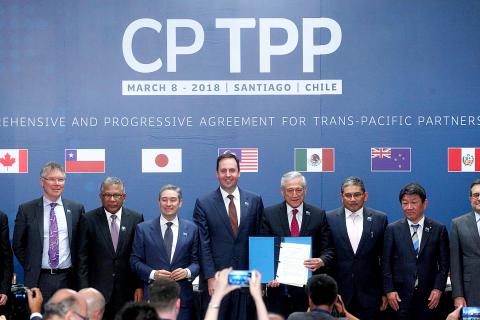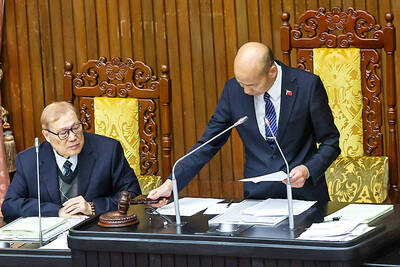Eleven nations on Thursday signed a slimmed-down version of the Trans-Pacific Partnership (TPP) trade agreement, moving to lower tariffs just as US President Donald Trump raised them after withdrawing from the deal.
The TPP, which would have represented 40 percent of the global economy and nearly one-quarter of its trade, was left for dead after Trump pulled out to pursue his “America First” agenda, but the revamped deal, now known as the Comprehensive and Progressive Agreement for Trans-Pacific Partnership (CPTPP), is still a significant achievement and a victory for openness, its supporters said at the signing ceremony in Santiago, Chile.
The pact includes Australia, Brunei, Canada, Chile, Japan, Malaysia, Mexico, New Zealand, Peru, Singapore and Vietnam, together representing 13.5 percent of the global economy.

Photo: AFP
The 11 states form a market of 500 million people, greater than that of the EU.
In Taipei, the Ministry of Foreign Affairs yesterday said that Taiwan’s participation in the CPTPP would help facilitate further cooperation and economic growth in the region.
Extending congratulations to the 11 member states on their signing of the deal, the ministry said that it signaled a new milestone in economic integration in the Asia-Pacific region.
The ministry said the successful signing was thanks to the remaining member states’ decision in November last year to withhold the ratification of parts of the clauses in TPP after the US’ withdrawal in January last year.
“Given that member states like Japan, Singapore, Malaysia and Vietnam are among Taiwan’s 10 largest trading partners, our participation in the CPTPP would help other members in the region further grow and cooperate with one another and jointly push for prosperity in the Asia-Pacific,” the ministry said.
President Tsai Ing-wen (蔡英文) and Premier William Lai (賴清德) have instructed various government agencies to do their utmost to prepare and garner support for the nation’s membership bid, the ministry said.
“We look forward to seeing the member states complete their domestic ratification process and start accepting new members, including Taiwan, to expand the benefits of the agreement,” the ministry said.
It added that it would continue to demonstrate to the member nations Taiwan’s willingness and the efforts it has made to be part of the region’s economic integration.
The government had sought for years to join the TPP, to no avail. The failure had largely been attributed to the nation’s import ban on US pork containing the leanness-enhancing feed additive ractopamine. Washington often criticizes the ban as not being based on science.
Although Washington’s withdrawal may have eliminated the US pork roadblock, there has been speculation that with Tokyo now at the helm of the deal, Taipei’s import ban on Japanese food products from five prefectures near the site of the 2011 Fukushima Dai-ichi nuclear power plant disaster could impede the nation’s membership bid.
The CPTPP deal was signed just before Trump slapped steep tariffs on imported steel and aluminum, setting up what many allies both at home and abroad warn could escalate into a global trade war.
Former US president Barack Obama’s administration pushed for the TPP as a counterweight to growing Chinese commercial power.
It not only cut tariffs, but required members to comply with a high level of regulatory standards in areas such as labor law and environmental protection.
Fernando Estenssoro, of Chile’s University of Santiago, said snubbing the pact is “a type of suicide” for the US.
Washington’s absence leaves an open path for China — which remains excluded from the deal — as it negotiates separately with Asian nations and New Zealand.
The CPTPP aims to slash tariffs among the 11 members and foster trade to boost growth.
“We’re very proud ... to show the world that progressive trade is the way forward,” Canadian Minister of International Trade Francois-Philippe Champagne said as officials gathered for the signing ceremony.
Felipe Lopeandia, Chile’s top trade negotiator, said the deal would “send a political signal to the world and to the United States itself, that this is a global agreement.”
The pact comes into force 60 days after it is fully ratified by six of the 11 nations.

DEFENDING DEMOCRACY: Taiwan shares the same values as those that fought in WWII, and nations must unite to halt the expansion of a new authoritarian bloc, Lai said The government yesterday held a commemoration ceremony for Victory in Europe (V-E) Day, joining the rest of the world for the first time to mark the anniversary of the end of World War II in Europe. Taiwan honoring V-E Day signifies “our growing connections with the international community,” President William Lai (賴清德) said at a reception in Taipei on the 80th anniversary of V-E Day. One of the major lessons of World War II is that “authoritarianism and aggression lead only to slaughter, tragedy and greater inequality,” Lai said. Even more importantly, the war also taught people that “those who cherish peace cannot

STEADFAST FRIEND: The bills encourage increased Taiwan-US engagement and address China’s distortion of UN Resolution 2758 to isolate Taiwan internationally The Presidential Office yesterday thanked the US House of Representatives for unanimously passing two Taiwan-related bills highlighting its solid support for Taiwan’s democracy and global participation, and for deepening bilateral relations. One of the bills, the Taiwan Assurance Implementation Act, requires the US Department of State to periodically review its guidelines for engagement with Taiwan, and report to the US Congress on the guidelines and plans to lift self-imposed limitations on US-Taiwan engagement. The other bill is the Taiwan International Solidarity Act, which clarifies that UN Resolution 2758 does not address the issue of the representation of Taiwan or its people in

The Philippines yesterday criticized a “high-risk” maneuver by a Chinese vessel near the disputed Scarborough Shoal (Huangyan Island, 黃岩島) in a rare incident involving warships from the two navies. The Scarborough Shoal — a triangular chain of reefs and rocks in the contested South China Sea — has been a flash point between the countries since China seized it from the Philippines in 2012. Taiwan also claims the shoal. Monday’s encounter took place approximately 11.8 nautical miles (22km) southeast” of the Scarborough Shoal, the Philippine military said, during ongoing US-Philippine military exercises that Beijing has criticized as destabilizing. “The Chinese frigate BN 554 was

LEISURE: The new law adds Confucius’ birthday, the anniversary of the Battle of Guningtou, Constitution Day and Little New Year as national holidays The Legislative Yuan yesterday passed new legislation adding four national holidays and making Workers’ Day a national holiday for all sectors. The Chinese Nationalist Party (KMT) and the Taiwan People’s Party used their combined majority in the legislature to push the jointly proposed draft through its third and final reading. This new law supersedes the existing regulations for the implementation of memorial days and state holidays, which are administered by the Ministry of the Interior. The new law recognizes Confucius’ birthday on Sept. 28, the anniversary of the Battle of Guningtou on Oct. 25, Constitution Day on Dec. 25 and “Little New Year,”